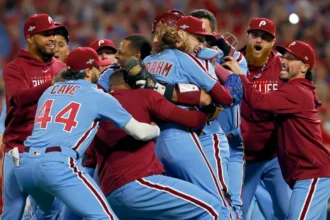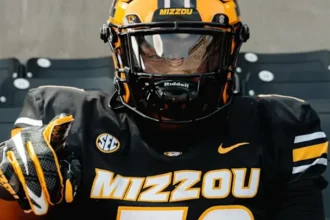Looking forward to a relaxed weekday series against the historically poor Chicago White Sox? Hoping to unwind after a long day with the game on in the background, letting your mind drift as the summer evening fades away?
Well, think again—
There’s no such thing as an “easy” win for a San Francisco Giants fan. No match-up is ever truly “in the bag.”
Despite being eliminated from postseason contention on the 17th—the earliest since the divisional era began in 1969—the White Sox have only 30 wins, close to 100 losses, and are on pace to add just 10 more victories. They’re on track to etch their names into the record books as one of the worst teams in history.
In the 8th inning, with the Giants leading 5-1, the broadcast displayed a curious fact: Chicago was mired in a 60-game losing streak when trailing after the 6th inning. This, on top of all the other numbers highlighting the Sox’s abysmal season, lulled me into a false sense of security. I finally felt comfortable enough to take my eye off the ball, open my laptop, and dive into a random but genuine concern about my inability to distinguish between different types of salmon.
I knew the male sockeye turns red when preparing to spawn, but didn’t the coho do the same? And what about pink salmon, often called “humpies” because of their curved backs—how do their humps compare to those of chum or sockeye? And how can you even tell them apart when they’re all covered in the silvery sheen of their ocean phase?
Amid my fishy worries, I noticed Spencer Bivens throwing a perfect four-seam fastball on the outside corner, only for Curt Casali to frame it awkwardly, leading the umpire to miss the call. The mood shifted. What should’ve been strike three and the second out of the inning instead forced another pitch to Korey Lee, who pulled it down the line for a double, putting runners on second and third. My anxiety began to rise.
I reluctantly closed my salmon tab as Bivens was replaced by Tyler Rogers. The Sox managed to string together a sacrifice fly—saved from being much worse by Michael Conforto’s diving catch in left—and a two-out RBI single. Two runs in, and the once comfortable 5-1 lead had shrunk to a save situation, promising a tense 9th inning.
The fact that the Giants were leading at all was somewhat surprising. Chicago had outhit San Francisco significantly in the early innings, tallying 11 hits and 3 walks. Their opposite-field approach against Kyle Harrison, combined with his inconsistent pitch command, put them in prime scoring positions in the 3rd, 4th, and 5th innings.
In the 3rd inning, the 7-8-9 hitters all reached base to load the bases with no outs, yet the Sox came up empty—a small comfort to us beleaguered Giants fans that this kind of failure happens to other teams, too.
Harrison got the critical unproductive out with a three-pitch strikeout of leadoff man Lenyn Sosa using his improved slurve. Chicago’s lone bright spot, Luis Robert Jr., stepped up and lashed a 107 MPH fastball toward the hole on the right side. Thankfully, Thairo Estrada and his reliable glove had returned to second base earlier that day. Estrada pounced on the ball and turned a 4-6-3 double play, keeping Chicago off the board.
But Harrison’s reprieve was short-lived. Two singles to start the 4th inning had him pitching from the stretch again, but he didn’t panic. Focusing on his location and trusting his secondary pitches, Harrison coaxed a force-out at second with a low-and-away change-up, putting runners on the corners. A 1-2 slurve induced a pop-up to short, and on the next pitch, Dominic Fletcher grounded out to end the threat.
The White Sox didn’t let up, finally breaking through with a 2-out RBI single by Robert in the 5th inning. The run was set up by Harrison’s walk to #9 hitter Brooks Baldwin, after getting him to an 0-2 count. Baldwin, whose career is only a month old, entered the game hitting .205 with an OBP under .280. I know it’s oversimplifying, but…he’s a pair of shoes. His speed is his biggest asset, and it shouldn’t be that hard for pitchers to keep him off base. Yet, Baldwin reached base four times last night (2 singles, 2 walks). The Giants couldn’t get him out. He even beat out a bunt single to load the bases in the 3rd, and in the 5th, he worked a walk and promptly stole second to set up Chicago’s first run.
The White Sox may have the worst offense in baseball, but the Giants were matching them stride for stride against starter Jonathan Cannon. The tall right-hander faced the minimum number of batters over the first three innings, tossing an 8-pitch 2nd inning with the help of a double play that erased Michael Conforto’s leadoff single. In the 4th, Conforto ripped a double into the left-field corner that would have scored almost anyone else, but the hobbled LaMonte Wade Jr. could only reach third before Cannon retired Matt Chapman on a flyout.
Chicago’s run in the top of the 5th served as a wake-up call, and it was the bottom of the Giants’ lineup that responded first. Estrada and Grant McCray both singled with one out, and backup catcher Curt Casali—who had just 10 plate appearances in August going into the game, and hadn’t recorded a hit since July 27th—delivered the key hit that turned the game around.
Casali was a late addition to the lineup after Patrick Bailey was scratched due to minor “side tightness.” It marked Casali’s first RBI since June 18th and sparked a familiar flurry of productive hitting from the San Francisco lineup. Casey Schmitt and LaMonte Wade Jr. each drove in runs, and Heliot Ramos followed with a sacrifice fly to center, allowing Schmitt to score easily. The Giants went 3-for-3 with a sac fly with runners in scoring position during the inning, and 4-for-6 in the game overall.
Matt Chapman’s solo homer in the 6th inning extended the lead, marking his 20th of the season. This milestone made Chapman just the second third baseman in franchise history—and the first since Hall of Famer Fred Lindstrom in 1930—to achieve a season with 20+ home runs, 30+ doubles, and 10+ stolen bases.
As mentioned earlier, just as a rhythmic calm should have settled over the evening, things took a chaotic turn. In the 7th inning, Michael Conforto grounded into a double play, squandering a bases-loaded scoring opportunity that began to loom large. The tension increased when Fitzgerald made a mental error on a routine grounder in the 8th, allowing Luis Robert Jr. to leg out a leadoff single, eventually leading to two runs.
In the 9th inning, with Jordan Hicks on the mound to close out the game (Ryan Walker was unavailable after working two innings on Sunday), the #9 hitter, Brooks Baldwin, singled to lead off the frame, immediately bringing the tying run to the plate. The defense—which had been excellent at times—faltered again on a double-play ball. Estrada initially bobbled the grounder, and Fitzgerald, whose timing was thrown off by the miscue, managed to get the out at second but rushed the throw to first, spiking it. The ball took a one-hop that Wade Jr. could have handled, but as he stretched for it, the ball slipped past his glove. If he had picked it cleanly, they likely would have gotten the runner at first.
Luis Robert Jr. then collected his third hit of the day, bringing the go-ahead run to the plate. Hicks managed to get Andrew Vaughn—who had been hitting the ball hard all evening—to fly out to left. But, as they say, the last out is always the hardest, especially for Hicks, who has struggled all season to secure that crucial third strike in an at-bat or third out in an inning. He quickly put Korey Lee in an 0-2 hole, but then lost control. A wild sweeper bounced in front of the opposite batter’s box, which Casali somehow managed to backhand, preventing the tying run from advancing to scoring position. However, the relief was short-lived as, on the very next pitch, Casali got crossed up on an elevated sinker that clanked off his palm, allowing the runners to advance anyway.
Now, with a full count, the tying run on second, the go-ahead run at the plate, and the eighth pitch of the at-bat looming—this is how normal teams secure wins against the White Sox, right?





